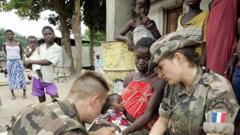Ivory Coast is set to see the departure of French troops as President Alassane Ouattara emphasizes modernization of local armed forces and reevaluation of military partnerships in West Africa.
French Troops Set to Withdraw from Ivory Coast: A Shift in Military Presence

French Troops Set to Withdraw from Ivory Coast: A Shift in Military Presence
Ivory Coast's President announces the planned withdrawal of French military forces, signaling changes in regional security dynamics.
The Ivory Coast government has confirmed that French military personnel will be withdrawing from the country, further diminishing France's established military presence in West Africa. In a statement given during an end-of-year address, President Alassane Ouattara indicated that this decision reflects the ongoing modernization efforts of the nation's armed services.
Currently, Ivory Coast hosts approximately 600 French troops, the largest contingent in West Africa, while Senegal is home to around 350 French soldiers. The announcement follows Senegal's recent declaration that France's military bases will be shut down by the end of 2025. President Ouattara noted that the military infantry battalion located in Port Bouét, which is overseen by the French army, will be transferred to Ivorian control.
France's involvement in West Africa has declined in recent years, especially after military coups in Mali, Burkina Faso, and Niger prompted the withdrawal of French forces in those nations and the rise of anti-French sentiment. On top of this, Chad has recently severed its defense cooperation agreement with France, another signal of the shifting dynamics within the region.
Senegalese President Bassirou Dioumaye Faye remarked on the need for a new defense and security cooperation doctrine, which will effectively eliminate all foreign military presence in Senegal by 2025. Faye, who came into office in March with a commitment to increased sovereignty, has called for an end to reliance on foreign military assistance.
Meanwhile, other countries in the region, including Mali, Niger, and Burkina Faso, are reportedly turning to Russia for military support, enlisting private contractors to help combat jihadist insurgencies. These shifts reflect a significant decline in France’s influence, which currently accounts for fewer than 2,000 troops stationed in the broader region, including areas such as Djibouti and Gabon.
For much of its post-colonial history, Ivory Coast has maintained a reputation for stability and economic strength, being the world's leading cocoa exporter. However, the nation has faced challenges since a civil war erupted in 2002, which resulted in a fractured political landscape that is only now beginning to stabilize.
As the landscape of military cooperation in West Africa continues to evolve, questions remain about the future of France's influence and the implications for regional security.
Currently, Ivory Coast hosts approximately 600 French troops, the largest contingent in West Africa, while Senegal is home to around 350 French soldiers. The announcement follows Senegal's recent declaration that France's military bases will be shut down by the end of 2025. President Ouattara noted that the military infantry battalion located in Port Bouét, which is overseen by the French army, will be transferred to Ivorian control.
France's involvement in West Africa has declined in recent years, especially after military coups in Mali, Burkina Faso, and Niger prompted the withdrawal of French forces in those nations and the rise of anti-French sentiment. On top of this, Chad has recently severed its defense cooperation agreement with France, another signal of the shifting dynamics within the region.
Senegalese President Bassirou Dioumaye Faye remarked on the need for a new defense and security cooperation doctrine, which will effectively eliminate all foreign military presence in Senegal by 2025. Faye, who came into office in March with a commitment to increased sovereignty, has called for an end to reliance on foreign military assistance.
Meanwhile, other countries in the region, including Mali, Niger, and Burkina Faso, are reportedly turning to Russia for military support, enlisting private contractors to help combat jihadist insurgencies. These shifts reflect a significant decline in France’s influence, which currently accounts for fewer than 2,000 troops stationed in the broader region, including areas such as Djibouti and Gabon.
For much of its post-colonial history, Ivory Coast has maintained a reputation for stability and economic strength, being the world's leading cocoa exporter. However, the nation has faced challenges since a civil war erupted in 2002, which resulted in a fractured political landscape that is only now beginning to stabilize.
As the landscape of military cooperation in West Africa continues to evolve, questions remain about the future of France's influence and the implications for regional security.



















